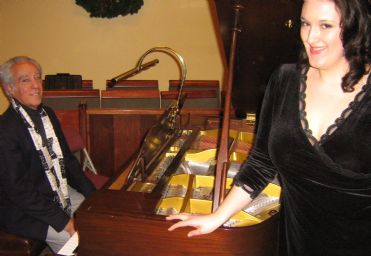|
Symphony
FROM THE NEW WORLD TO THE OLD WORLD
by Peter Lert
Saturday, June 14, 2025
Chamber
MC2 DUO RECITAL CLOSES 222'S SEASON
by Terry McNeill
Saturday, June 14, 2025
Choral and Vocal
CANTIAMO SONOMA'S LUSCIOUS A CAPELLA SINGING IN SEASON ENDING CONCERT
by Pamela Hicks Gailey
Sunday, June 8, 2025
Symphony
SRS SEASON ENDS WITH RESOUNDING TA-TA-TA-BANG
by Terry McNeill
Sunday, June 1, 2025
Symphony
YOUTHFUL VIRTUOSITY ON DISPLAY AT USO'S MAY CONCERTS
by Peter Lert
Saturday, May 17, 2025
Symphony
MYSTICAL PLANETS AND LIVELY GERSHWIN ORTIZ AT FINAL SRS CONCERT
by Peter Lert
Sunday, May 4, 2025
Symphony
VSO'S CONCERT MUSIC OF TIME, MUSIC OF PLACE
by Peter Lert
Sunday, April 27, 2025
VOCAL ELEGANCE AND FIRE AT THE 222'S RECITAL APRIL 26
by Pamela Hicks Gailey
Saturday, April 26, 2025
CANTIAMO SONOMA SINGS AN INSPIRED GOOD FRIDAY MOZART REQUIEM CONCERT
by Pamela Hicks Gailey
Friday, April 18, 2025
DRAMATIC SHOSTAKOVICH SYMPHONY CLOSES PHILHARMONIC'S 25TH SEASON
by Terry McNeill
Sunday, April 13, 2025
|
 |
 Pianist John Boyajy and Soprano Bryn Jimenez |
SCHUBERT AND EXALTED MOZART IN NOVATO RECITAL
by Terry McNeill
Sunday, January 3, 2010
Marin pianist John Boyajy can’t be neutral about any important musical matter. He has passion and the ability to speak extensive words about that passion, and his excitement about Schubert, Bach and Mozart was everywhere in evidence in a duo recital with soprano Bryn Jimenez Jan. 3 in Novato’s All Saints Lutheran Church. Fifty-Five attended on a gloomy and cold day
Beginning with Schubert’s B-Flat Impromptu from Op. 142, Mr. Boyajy set the afternoon’s stage with a reading replete with chaste phrasing and balanced contrasts in the theme, five variations and coda. The non-professional church piano allowed a delicate treble pianissimo in the slow and dignified third variation but had a muddy bass section. Mr. Boyajy underscored the modulation leading to the final variation, his fast scales shimmering. The two chords of the coda were deftly played, the final one oddly broken.
Soprano Bryn Jimenez joined Mr. Boyajy in three Schubert songs to close the first half. Ms. Jimenez has a big and sometimes brash voice, not always suited to the nuance of Schubert lied, but possessing good German diction and ample drama. In “Ganymed” (D. 544) the long sustained notes were floated with care, and the piano’s ending resolution into the major was beautifully crafted. The “Gretchen at the Spinning Wheel” (D. 118) began with requisite rumbling repetitive piano chords, depicting the spinning process, and Ms. Jimenez’s vocal line flew effortlessly in the upper register. Here her lower staff richness became at times monochromatic, especially at high volume, but there was no lack of drama and pathos. The concluding “The Young Nun” (D. 828), a complex work from 1825 projecting an intense spiritual ecstasy, was sung with a beguiling mystery in the low voice and intrinsic histrionics. It was a gripping reading.
Bach’s C Minor Fantasia (S. 906) began the second half, in Mr. Boyajy’s capable hands. It’s a brilliant if short work, with large chromatic modulations. The pianist provided a performance that had aspects of Scarlatti’s sonatas, the turns and mordents directly stated and finger articulation and trills artfully executed.
Mozart’s solo motet “Exsultate Jubilate” (K. 165) closed the program and brought out the best singing of the afternoon. In the opening Allegro Ms. Jimenez chose a narrower vibrato than used in the Schubert songs, and Mr. Boyajy’s accompaniment was continuously forceful. The Larghetto begins with a recitative reminiscent of “The Marriage of Figaro” and was thoughtfully sung, the piano line subtlety played and modulating to the famous “alleluia” finale. Here Mozart asks a lot of the singer, the playful and happy text exploring a wide range of vocal color. Ms. Jimenez left nothing on the table, her powerful voice bringing the audience to its feet.
An encore was demanded and surprisingly Ms. Jimenez deferred to her partner, as Mr. Boyajy played Debussy’s “Doctor Gradus ad Parnassum” from the Children’s Corner Suite. The scales were fast and the legato balanced, perhaps the most virtuosic pianism of the concert.
|

